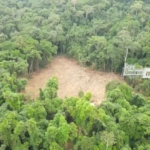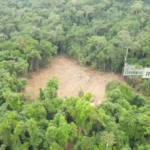
For decades, Ghana has been celebrated for its abundant natural resources and rich forest cover. From the tropical rainforests of the Western and Ashanti regions to the savanna woodlands in the north, Ghana’s forests have long played a central role in the country’s ecological health, cultural identity, and economic development. These forests are more than just landscapes—they regulate rainfall, purify the air, shelter wildlife, and serve as vital economic lifelines for rural communities. However, a recent study led by Dr. Joseph Antwi Baafi and his team from the Akenten Appiah-Menka University of Skills Training and Entrepreneurial Development (AAMUSTED) has sounded the alarm: Ghana’s forests are disappearing at a rate that may soon become irreversible.
Titled “Forestry and Economic Growth in Ghana: Evaluating the Dynamics Using the Environmental Kuznets Curve and Adjusted Net Savings,” the study explores the economic forces behind forest degradation and proposes forward-thinking solutions for saving what’s left. Between 2001 and 2023, Ghana lost approximately 3.4% of its forest cover annually, making it one of the fastest-deforesting nations in Africa. Behind this disturbing trend lie several interlinked drivers: uncontrolled agricultural expansion, illegal logging, foreign-backed resource extraction, inflation-driven dependence on forest resources, and perhaps most significantly, illegal small-scale mining—commonly known as galamsey.
The Silent War: Illegal Mining and Forest Destruction
Of all the culprits behind Ghana’s disappearing forests, illegal mining poses the most immediate and devastating threat. Though small-scale mining has been a part of Ghana’s heritage for centuries, the recent explosion of unregulated and destructive galamsey activities has turned forest landscapes into craters of waste and pollution.
Galamsey operations, often supported by powerful political and economic actors, dig through protected forests with impunity, leaving behind toxic pits, deforested hillsides, and poisoned rivers. Mercury and cyanide used in gold processing seep into waterways, endangering aquatic life and entire communities downstream. Rivers such as the Pra, Ankobra, and Offin—once pristine—now flow thick with mud and chemicals.
Despite several government task forces and public campaigns to eliminate illegal mining, enforcement has remained inconsistent, and galamsey continues to thrive in remote areas. The study by Dr. Baafi identifies galamsey as a key, yet underemphasized, driver of Ghana’s environmental decline. It warns that unless Ghana addresses this issue with urgency and political resolve, no amount of tree planting or reforestation efforts will reverse the damage.
Understanding the Broader Picture: Why Are Forests Disappearing?
Beyond galamsey, the study outlines other factors eroding Ghana’s forests. Chief among them is the aggressive push for agricultural land. As Ghana’s population rises, more land is needed to grow food and cash crops like cocoa, oil palm, and rubber. These expansions often involve clearing vast areas of forest without effective replanting.
Illegal logging also continues to undermine forest protection laws. Syndicates, sometimes in collaboration with corrupt officials, harvest timber without permits, often targeting rare hardwoods. This extraction not only threatens biodiversity but also weakens forest ecosystems already stressed by climate change.
Moreover, foreign direct investment (FDI), while vital for Ghana’s economic growth, has often been directed into resource-intensive sectors like mining and commercial agriculture. Without strict environmental regulations, these investments contribute significantly to deforestation. The study found that FDI had a statistically significant impact on deforestation, especially in areas where governance is weak and environmental enforcement is lacking.
Interestingly, inflation also plays a role. As the cost of living rises, many Ghanaians turn to forests to meet their basic needs—cutting trees for firewood or farming on marginal forest land. While population growth alone is not to blame, it adds further pressure to land use, especially in urbanising areas.
Is There Hope? The Environmental Kuznets Curve Gives Some
Despite the grim picture, the study offers a beacon of hope through the lens of the Environmental Kuznets Curve (EKC). The EKC theory proposes that environmental degradation increases during the early stages of economic development but declines once a country reaches a certain level of income and institutional maturity.
Applied to Ghana, the EKC suggests that while rapid economic growth has initially led to more deforestation, the country could reach a tipping point where rising incomes, better education, stronger governance, and technological improvements begin to reverse environmental damage. Encouragingly, the study found signs that Ghana may be approaching this turning point—if it embraces sustainability more consciously.
This means the country still has time to chart a different path—one that combines economic expansion with forest preservation. But this opportunity window is narrowing. Unless bold action is taken now, the damage may become too deep to repair.
Changing the Way We Measure Progress: Introducing Adjusted Net Savings
One of the most transformative ideas in the study is the use of Adjusted Net Savings (ANS) as an economic yardstick. Unlike GDP, which only measures how much a country produces, ANS accounts for environmental costs—like the loss of forests or pollution from industry.
In other words, a country could be growing its GDP while destroying its natural capital, resulting in a negative ANS. That’s like earning more money each year but spending your savings and selling your land to do it. Eventually, you’ll go broke. Ghana, the study warns, is at risk of doing just that.
By using ANS alongside GDP in development planning, policymakers can better understand whether projects truly add value to the nation or merely deplete its environmental wealth. For example, a logging concession or mining operation may boost GDP in the short term but lower ANS if it results in significant forest loss or pollution.
Policy Solutions: How Ghana Can Save Its Forests
The study does not stop at diagnosis; it provides a roadmap of solutions grounded in economic and environmental evidence:
- Integrate Sustainability into Every Economic Policy
No development plan—whether in mining, agriculture, or infrastructure—should be approved without a sustainability impact assessment. Environmental safeguards must be legally binding and strictly enforced. - Adopt Adjusted Net Savings as a Planning Tool
ANS should be used by the Ministry of Finance, the Environmental Protection Agency, and all key government bodies to evaluate the long-term sustainability of public investments. - Tackle Illegal Mining with Strategy, Not Just Force
Military crackdowns have yielded mixed results. Instead, Ghana should adopt a multi-pronged approach: combine enforcement with alternative livelihoods, technical education, community vigilance, and legal small-scale mining support systems. - Redirect Foreign Investment to Sustainable Sectors
Ghana can attract responsible investors by offering tax incentives and regulatory support for sectors like renewable energy, eco-tourism, sustainable farming, and forest restoration. - Stabilise Prices to Reduce Forest Dependency
High inflation increases the cost of living and pushes people to exploit forests. By keeping inflation under control, the government can reduce this pressure on natural ecosystems. - Empower Communities Through Forest Stewardship
Community-Based Natural Resource Management (CBNRM) has proven effective in other countries. When communities benefit directly from managing forest resources—through revenue sharing, eco-enterprises, or land titles—they are more likely to protect them. - Establish Green Investment and Restoration Funds
Special funds should be created to finance reforestation, conservation education, and green businesses. These funds could provide low-interest loans, grants, and startup capital for youth-led environmental initiatives. - Allocate Budgets Based on Environmental Performance
Regions with strong ANS scores and low deforestation rates should be rewarded with larger development budgets and national recognition.
Conclusion: A Defining Moment for Ghana’s Future
Ghana is standing at a historic crossroads. One path leads to short-term wealth but long-term environmental collapse. The other leads to sustained prosperity built on careful stewardship of forests, rivers, and land.
The choice is clear: the country must change course—urgently. The destruction caused by galamsey, illegal logging, and unsustainable agriculture is not just a local issue. It is a national crisis that threatens food security, public health, biodiversity, and even Ghana’s standing in the international community.
Dr. Baafi and his colleagues have given Ghana a clear and evidence-based message: economic growth must not come at the expense of the country’s forests. The time to act is now—not tomorrow, not next year.
If we fail to protect our forests today, future generations may inherit a barren land, depleted rivers, and fragile communities. But if we act wisely—and bravely—Ghana can be a shining example of how a nation grows economically while keeping its natural heritage alive.
The question, then, is not whether Ghana can afford to protect its forests. It is whether Ghana can afford not to.
Joseph Antwi Baafi and Kwame Acheampong Department of Economics Education, Akenten Appiah-Menka University of Skills Training and Entrepreneurial Development, Kumasi, Ghana
Michael Kwame Asiedu School of Business, Conestoga College, Kitchener, Canada, and Pearl Seyram Kumah Department of Accounting Education, Akenten Appiah-Menka University of Skills Training and Entrepreneurial Development, Kumasi, Ghana.
- President Commissions 36.5 Million Dollars Hospital In The Tain District
- You Will Not Go Free For Killing An Hard Working MP – Akufo-Addo To MP’s Killer
- I Will Lead You To Victory – Ato Forson Assures NDC Supporters
Visit Our Social Media for More




